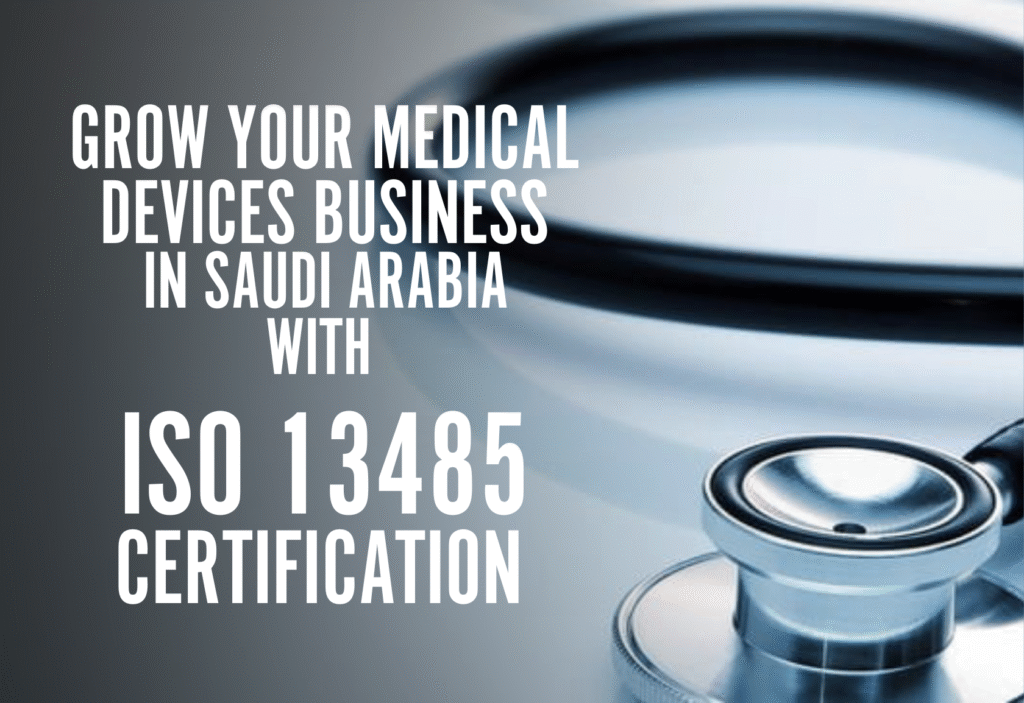The medical devices industry is one of the fastest-growing sectors in Saudi Arabia, driven by the Kingdom’s Vision 2030 initiatives and heavy investments in healthcare infrastructure.
With increasing demand for safe, reliable, and high-quality medical devices, businesses must meet global standards to stay competitive. One of the most effective ways to achieve this is through ISO 13485 certification.
This internationally recognized standard ensures that organizations consistently deliver safe and effective medical devices while complying with regulatory requirements.
What is ISO 13485 ?
ISO 13485 is the global standard for Quality Management Systems (QMS) specifically designed for the medical devices industry. It sets requirements for the design, development, manufacturing, and servicing of medical devices, ensuring compliance with international regulations and customer expectations.
By adopting ISO 13485, organizations can demonstrate their commitment to safety, reliability, and efficiency in every aspect of their operations.

Why is ISO 13485 Important ?
Saudi Arabia is home to leading medical device manufacturers and suppliers, making it essential for businesses to align with global standards. ISO 13485 provides a framework that ensures consistent processes, reduced risks, and improved patient safety.
The certification is particularly valuable as Saudi Arabia expands its healthcare sector. For example, in 2024, the Minister of Health inaugurated multiple healthcare projects in Al Ula, highlighting the country’s ongoing investments.
To compete in such an environment, businesses must implement best practices, meet strict regulatory requirements, and build international credibility.
ISO 13485 certification also serves as a gateway to global markets, enabling Saudi companies to establish trust with international partners, healthcare providers, and patients.
Benefits of ISO 13485 Certification in Saudi Arabia
Implementing ISO 13485 offers several benefits to organizations in the medical device industry:
· Ensures compliance with regulatory and legal obligations.
· Enhances product safety, quality, and reliability.
· Builds customer and partner trust through a globally recognized standard.
· Improves efficiency with regular audits, risk detection, and streamlined processes.
· Expands business opportunities within Saudi Arabia and across international markets.
By embedding ISO 13485 practices, organizations not only improve their internal systems but also strengthen their global competitiveness.
Steps to Achieve ISO 13485 Certification
Obtaining ISO 13485 certification requires a structured approach:
Step 1: Get Familiar with the Standard
Review ISO 13485:2016 to understand requirements related to quality and risk management.
Step 2: Conduct a Gap Analysis
Compare existing systems against the standard to identify areas for improvement.
Step 3: Update the QMS
Revise policies, procedures, and documentation to align with ISO 13485 requirements.
Step 4: Training
Educate employees on their roles, responsibilities, and the importance of compliance.
Step 5: Run the System
Implement the updated QMS for 3–6 months and maintain proper records.
Step 6: Internal Audit
Evaluate compliance through internal audits and management review meetings.
Step 7: Select a Certification Body
Choose an accredited certification body in Saudi Arabia.
Step 8: Documentation Review
During stage one, auditors review QMS documentation to identify any gaps.
Step 9: On-site Audit
In stage two, auditors assess the practical implementation of your QMS. Non-conformities, if found, must be corrected within the given timeframe.
Once both audits are successfully completed, your organization will be awarded ISO 13485 certification, valid for three years. Surveillance audits will be conducted during this period, with a recertification audit required at the end of the third year.
Conclusion
ISO 13485 certification is more than a compliance requirement—it is a strategic investment in safety, trust, and global recognition. For medical device businesses in Saudi Arabia, adopting this standard not only enhances operational efficiency but also opens doors to international markets and long-term partnerships.
By prioritizing quality and patient safety, organizations can position themselves as leaders in the Kingdom’s fast-growing healthcare sector and beyond.
Drop us an email [email protected]
Services Offered :- Riyadh, Dammam, Yanbu, Jeddah, Jubail, Hofuf